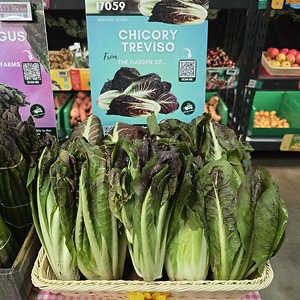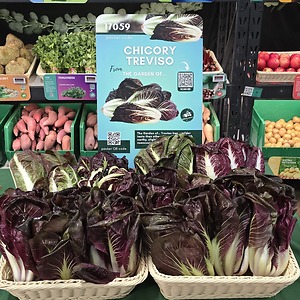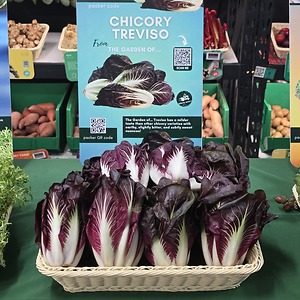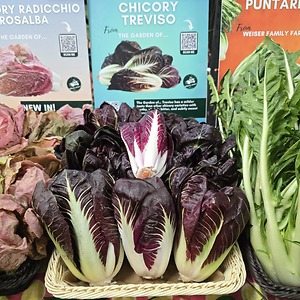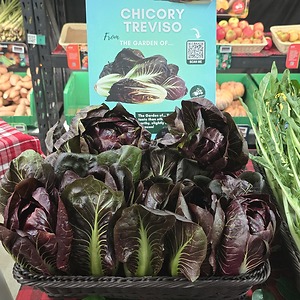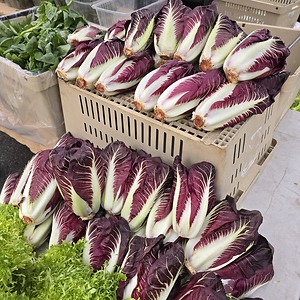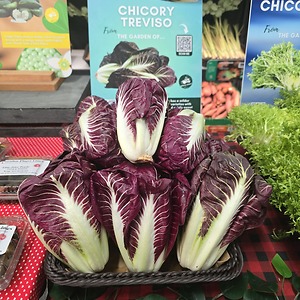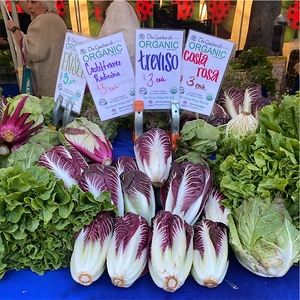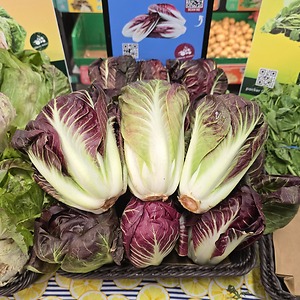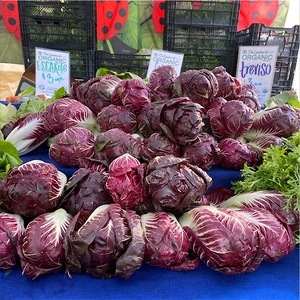

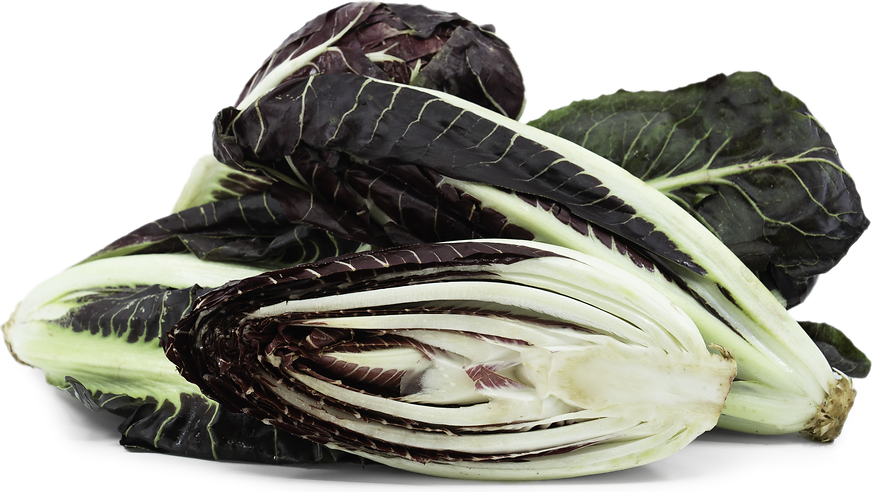
Treviso
Estimated Inventory, 8 lbs : 13.23
This item was last sold on : 08/02/25
Description/Taste
Treviso ranges in size from small to large, depending on cultivation methods, and generally averages 25 to 35 centimeters in length. The leafy vegetable has an elongated, torpedo-like shape and is comprised of tightly packed, layered leaves. There are two types of Treviso, an early harvest variety that remains tightly closed and a late harvest variety with a narrow base opening to unfurling, curled leaves. Each leaf is slender with an oval, spoon-shape, and the stems are thick, branching into large capillaries throughout the leaf. Treviso is known for its crunchy, succulent, and fleshy white stems, and the leaves are tender and crisp with a signature maroon, dark purple-red hue. In cultivation, the leaves begin green and transition into their bi-colored nature when immersed in darkness and shocked with cold temperatures. Treviso has an earthy, slightly bitter, and subtly sweet flavor. The variety is milder than other chicory types, and its bitter taste will further mellow when utilized in cooked preparations.
Seasons/Availability
Treviso is available in the fall through early spring.
Current Facts
Treviso, botanically classified as Cichorium intybus, is an Italian type of chicory belonging to the Asteraceae family. The heirloom variety was first cultivated for commercial use in the 16th century and is also known as Radicchio Rosso de Treviso and Treviso Red Chicory. Treviso is typically harvested 70 to 100 days after sowing and is one of the only types of chicory that must be processed before they are sold in markets. There are two types of Treviso in Italy, an early harvest known as Precoce and a late harvest known as Tardivo. Precoce Treviso has a more compact, tightly closed appearance, while Tardivo Treviso is open with curling, slender leaves. Both types of Treviso are grown in fields, left to survive multiple touches of frost, and the exterior leaves are gathered and tied to cover the interior leaves. One key difference is that Tardivo Treviso is then shocked in cold natural spring water and kept in darkness before being sent to the market. Treviso has received a PGI, also known as a Protected Geographical Indication, highlighting that the Treviso grown within its small native region of northern Italy is distinct due to its climate, terroir, natural spring water, and detailed processing requirements, such as carving the stem by hand into a signature, angular shape.
Nutritional Value
Treviso is an excellent source of vitamin K to assist in faster wound healing, vitamin A to maintain healthy organ functioning, and copper to develop connective tissues. The vegetable is also a good source of potassium to balance fluid levels within the body, fiber to regulate the digestive tract, antioxidants to protect the body against free radical and external environmental damage, and other nutrients such as zinc, vitamin C, phosphorus, and iron. The bitter flavor within Treviso is created from the presence of lactucopicrin.
Applications
Treviso has a mild, bitter, and earthy flavor with subtly sweet undertones, suited for fresh or cooked preparations. The tender, crisp leaves can be used similarly to other chicory varieties and are commonly tossed into salads, displayed on appetizer plates as a dipping vessel, served with cheeses, and drizzled in honey with crushed nuts, or shredded and topped over avocado and egg toast. Treviso can also be incorporated into tapenades, the leaves slightly filled with sauces, spreads, or finely chopped vegetables, or used as a decorative, edible garnish. In addition to fresh preparations, Treviso is most famous for its mildly bitter flavor when grilled and drizzled in olive oil or balsamic. The leaves can also be braised, sauteed, blanched, or slow-cooked into vegetable side dishes, soups, curries, and stews, or they can be mixed into risotto, pasta, and other cream-based dishes. Treviso can also be stirred into vegetable slaws and roasted dishes, baked into quiche, used as a poultry stuffing, filled as an edible serving cup, or lightly cooked and used as a bed of greens for meats. Beyond savory preparations, Treviso is sometimes incorporated into torta di radicchio, a sweet cake covered in a white chocolate glaze. Treviso pairs well with cheeses such as parmesan, gorgonzola, asiago, and goat, nuts including walnut, hazelnut, and almonds, sage, fennel, leeks, pumpkin, carrots, meats such as sausage, prosciutto, beef, and poultry, and fruits such as pears, apples, citrus, and stone fruit. Whole, unwashed Treviso will keep 1 to 2 weeks when loosely wrapped in plastic and stored in the refrigerator's vegetable drawer.
Ethnic/Cultural Info
In Italy, Treviso is primarily known as Radicchio Rosso de Treviso, and the vegetable is so prized in the country that it is monitored and protected by the Consorzio Radicchio di Treviso, or the Consortium for Treviso Red Radicchio. There are 140 members a part of the consortium, and the group was established in 1996 to ensure traditional techniques were being used to grow IGP Treviso. Consortium members also promote and educate the public on the unique features of Treviso and how the heirloom is vital to the history of Italian agriculture. Authentic Radicchio Rosso di Treviso IGP is immersed in spring water from the Sile river in a process known as “bleaching.” This cold shocking causes the leaves to turn purple and the stems to develop their crisp, white appearance. The spring water also contributes nutrients to build the vegetable’s mild, bitter flavor.
Geography/History
Treviso is native to the Northern Italian region of Veneto, specifically from the city of Treviso. The exact history and date of origin of the variety are unknown, but the cultivation of the chicory began sometime around the 16th century. One of the first records of red chicory was captured in a 16th-century painting known as “The Wedding at Cana,” created by Leandro Da Ponte. In the painting, types of red chicory are seen in several fruit and vegetable baskets. Treviso continued to be cultivated in regions of Italy and was later recorded in garden books in the 1800s. In 1876, agronomist Giuseppe Benzi arrived in the city of Treviso and established Treviso as a prized vegetable. Benzi became the head of the Treviso Agricultural Association and hosted several exhibitions of the vegetable in the early 1900s. Treviso was eventually granted an IGP, or Indication of Geographic Protection, a mark of quality on Treviso grown within the regions of Treviso, Venice, and Padua in Italy. The variety was later introduced to Australia in 2002. Today Treviso is produced in Europe, the United States, and Australia and is found through specialty markets, grocers, and distributors.
Featured Restaurants
Restaurants currently purchasing this product as an ingredient for their menu.
| Farmer and The Seahorse | San Diego CA | 619-302-3682 |
| Shorehouse Kitchen Carlsbad | Carlsbad CA | 858-663-9916 |
| Piatti | San Diego CA | 858-454-1589 |
| Village Vino | San Diego CA | 619-546-8466 |
| Marisi La Jolla | La Jolla CA | 951-852-6730 |
| US Grant Hotel Main | San Diego CA | 619-232-3121 |
| The Santaluz Club Inc - Banquet | San Diego CA | 858-759-3150 |
| Fairmont Grand Del Mar | San Diego CA | 858-314-1975 |
| Shorehouse Kitchen | La Jolla CA | 858-459-3300 |
| Catania La Jolla | La Jolla CA | 619-884-5350 |
| Manchester Grand Hyatt San Diego | San Diego CA | 619-232-1234 |
| Cucina Enoteca | Del Mar CA | 619-239-2222 |
| Miho | San Diego CA | 619-365-5655 |
| Sandpiper Wood Fired Grill & Oysters | La Jolla CA | 858-228-5655 |
| La Jolla Beach & Tennis Club | San Diego CA | 619-816-8319 |
| Manchester Grand Hyatt Sallys | San Diego CA | 619-232-1234 |
| Pali Wine Company | San Diego CA | 310-893-0038 |
| Park Hyatt Aviara (Ember & Rye) | Carlsbad CA | 760-448-1234 |
| Nolita Hall | San Diego CA | 619-618-8820 |
Recipe Ideas
Recipes that include Treviso. One



